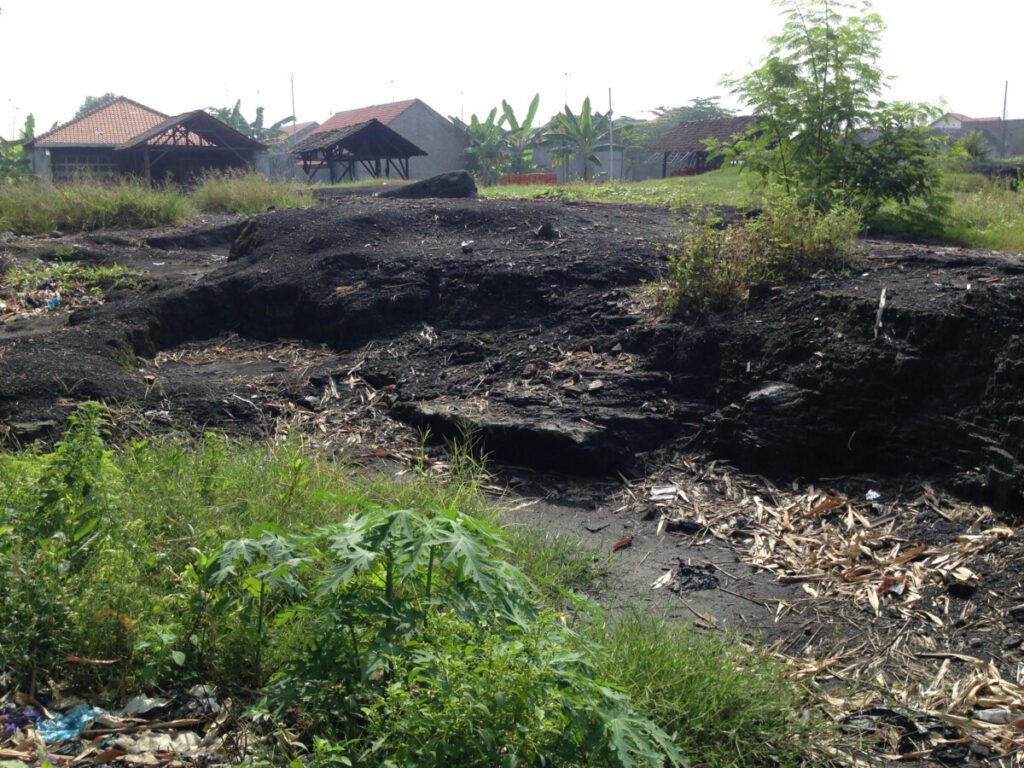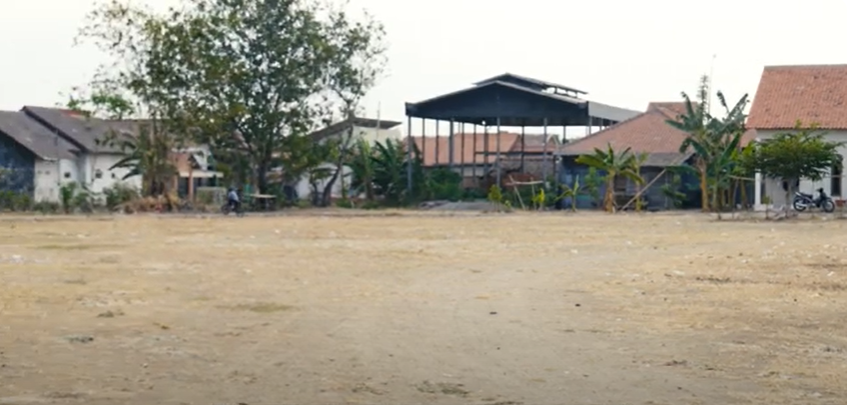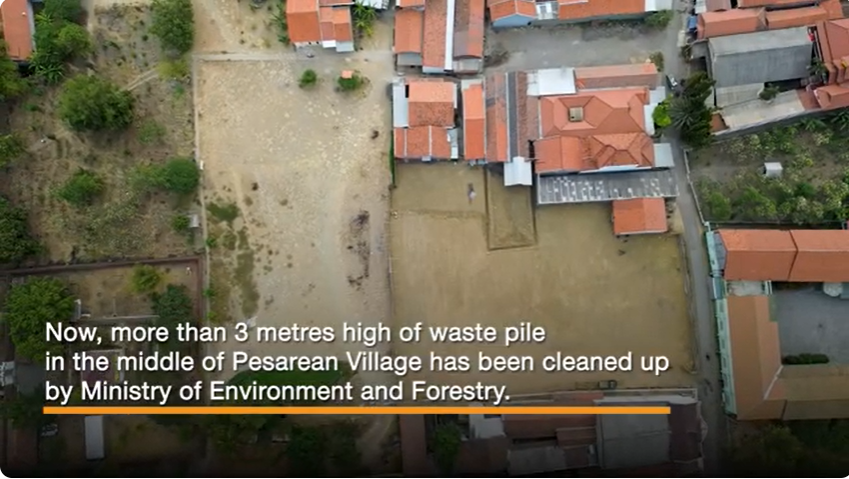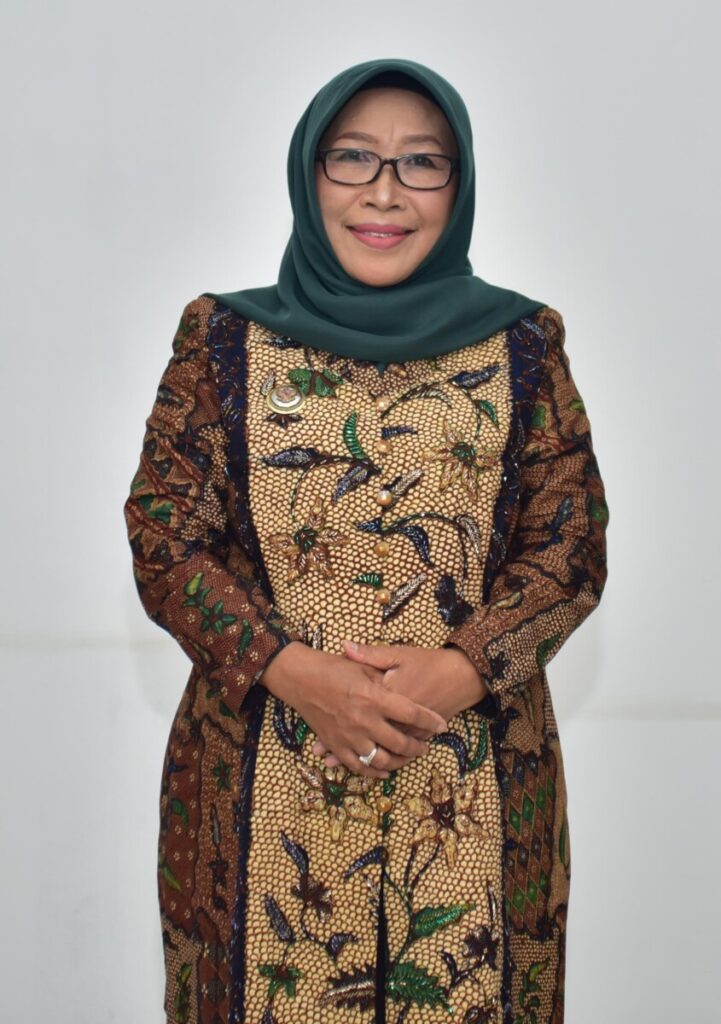KLIK DI SINI untuk membaca artikel dalam Bahasa Indonesia.
For decades, Pesarean Village in Tegal Regency, Central Java Province, Indonesia, has been contaminated with lead. More than 18,000 tons of Used Lead Acid Batteries (ULAB) and metal smelting waste were dumped in the middle of residential areas. Currently, Pesarean is undergoing a transformation to be free from lead contamination. Learn about, Umi Azizah, one of the key figures behind Tegal Regency’s success in reducing the adverse effects of lead exposure that is harmful to health and the environment.
Umi Azizah, a remarkable woman who served as Tegal’s Vice Regent from 2013 to 2018 and as Tegal’s Regent from 2019 to 2024, is one of the people who has been the driving force behind the handling and reduction of the adverse effects of lead exposure in Tegal Regency.
Today, the more than 3-meter-high pile of hazardous waste in the middle of Pesarean Village has been cleared by the Ministry of Environment and Forestry (KLHK). The previously contaminated solids have now been replaced with soil free of B3 waste contamination. Pesarean now has the opportunity to transform into a tourist destination. The next step is to address contaminated areas outside the dumpsite.
Tegal Regency was among the first regions in Indonesia to take the lead in addressing lead contamination issues in a comprehensive manner, from the recovery of land contaminated with hazardous waste, the provision of TPS (Temporary Storage Site) for hazardous waste, socialization to communities in exposed areas such as Pesarean both before and after recovery, to the development of an Action Plan to Reduce Lead Poisoning in Children in Tegal Regency. In terms of financing, Tegal Regency did not only rely on the state budget and funding support from international organizations, but also the local budget. This can be a model for other regions.
Believing that a healthy and good environment is the human right of all citizens in Indonesia, Umi Azizah, who has just ended her term as Tegal Regent, was motivated to make various efforts to reduce the adverse effects of lead exposure in her area.
Personally, outside of the office, Umi – since 1997 – has often visited the Pesarean area, and felt quite sad to see the condition of the village whose environment is exposed to lead toxins, especially when she saw the condition of the exposed people who were mostly women and children. Home-based metal casting industries ranging from tin, aluminum, copper, and used batteries appear to be numerous in the area. The number of business actors is increasing. Waste categorized as B3 piled up mixed with soil such as on roads, yards, and the most abundant was on the land of the Surakarta Palace, next to the tomb of Amangkurat 1, piled up into a high pile.
When Umi later became Deputy Regent of Tegal and then Regent of Tegal, she promised herself to do more, not just to feel sorry, but to do something to improve and build future generations that are more qualified, healthy, and not sickly so that they can reach more potential to progress.
Finally, the metal foundry activities were relocated to a place far from residential areas because at that time the B3 waste piles had eroded the lives of Pesarean residents. Residents no longer dare to use water, either for washing or drinking, due to its black color because it has been contaminated with B3 waste. Not only contaminating groundwater, the toxins also disrupt the health of local residents such as decreased fertility, kidney damage, blood cancer, even mental disorders and birth defects.
There was a study from the Ministry of Environment and Forestry in 2011/2012 which showed dangerous concentrations of metals in the soil of Pesarean settlement. The volume of soil contaminated with B3 waste is approximately 20,000 cubic meters in an area of 12,000 square meters on roads, cemeteries, school yards, yards as well as in open spaces. Initial efforts to remediate contaminated land began in 2018 by KLHK at the Pesarean dumpsite. Efforts to clean up contaminated land at the dumpsite and surrounding areas were carried out in stages from 2018 to 2023. While in 2024, the remediation plan will be carried out again outside the dumpsite.

When asked what challenges Umi faced when conducting a series of efforts to reduce the adverse effects of lead exposure in the Pesarean area, Umi said, “The challenge is to sensitize the surrounding community when they are already comfortable with the toxic health and environmental conditions. For people who usually work in the informal sector, we have to think long, because this concerns their economy. But because it’s also about public health, we can’t give up, we have to keep building people’s awareness that they are living in a totally unhealthy environment. Providing financial loans to relocate people’s businesses to non-settlement areas is one of the solutions offered. The key is to communicate across the community through religious leaders, community leaders, with approaches from various sides. We have to be willing to hear their complaints too. We also have to calculate the budget requirements, which are not small. The local government budget is limited, so we coordinate with the legislature. We also took a social approach, coordinating with various environmentally conscious non-governmental organizations (NGOs). Gradually, we were able to carry out remediation.”
According to Umi, the benefits have begun to be felt by the community in Pesarean village after the remediation was carried out, where they are happier with a clean and healthy environment. They can already feel comfortable with the air that is no longer polluted, the polluted sound is also gone, the contaminated land has been restored. The land that used to hold piles of waste and is now clean can even be used as a children’s play area.

According to Umi, the action plan will continue to be implemented. Every year it will be evaluated. The initial stage of the future program has been prepared to bind the commitment of various cross-sectors in order to reduce lead exposure. Umi also said that without the Perbup, it will be difficult for all of us to reduce lead exposure. Health check efforts to determine the impact of interventions that have been carried out by the Tegal Regency government in the form of medical examinations, routine monitoring in the Pesarean area need to be carried out. Public awareness still needs to be maintained. Public awareness campaigns should always be conducted, for example through community leaders by informing through various recitation activities, religious festivals, to then insert information on how to make people more aware of the issue of lead exposure, which is a serious and major issue both in terms of health and the environment.

Considering the environmental and health impacts of lead exposure, Tegal regency, in collaboration with Unicef and Vital Strategies, developed an action plan to reduce lead poisoning in children from 2023 to 2027 with a focus on prevention and recovery of children from lead poisoning with special therapy, including pregnant women. The document has been formalized as Tegal Regent Regulation No. 71 of 2023.
Umi then added, “For all issues in the regions, we have to share roles, including handling hazardous waste between the central and regional governments. This is evidenced by joint activities such as studies with the central and provincial governments. In the future, it is hoped that the central government can help implement the action plan that has been prepared, so that no more people do business with B3 waste. Do not let the problem in Pesarean be solved, then another problem arises in Kebasen (the place that is used as a relocation area) with the problem of B3 waste. They need to be equipped with knowledge of metal casting technology to be more environmentally friendly, and law enforcement needs to be improved. This all needs to be supported by KLHK, the Ministry of Health, and the Ministry of Tourism. The central government can help to restrict the trade of metal foundries that are not environmentally friendly. It takes a program that is a unity or integration of programs from many sides.”
When Umi approaches people living in lead-exposed areas, the most effective way is to understand the character of the community. The communication approach by empowering the surrounding community, empowering community leaders, religious leaders, and using communication strategies that are in accordance with the character of the community is quite effective. In Pesarean or Tegal more broadly, the character of the community is a lot of people who often gather in recitation. So the approach is more adapted to the character of those who like to gather at the recitation. With wise communication methods that are easily accepted by them, it will be easier for them to understand the dangers of lead.
“We invite them to be involved in every action plan-oriented activity, including private institutions through Customer Social Responsibility (CSR) activities. The point is that we invite them to feel that they can be part of the Tegal Regency government’s efforts in dealing with reducing the adverse effects of lead poisoning. We involve them,” said Umi.

“In addition to empowering the community to feel involved in dealing with common problems, we continue the activities that have been provided such as inviting them to comply with all applicable regulations in terms of safety and the environment. How do we get the informal business owners to change professions to do work that does not have a negative impact on health and the environment,” Umi adds.
Then came the concept of a religious tourism village. “The land around the area affected by B3 waste in Pesarean Village has a cultural heritage of Amangkurat 1 tomb which is visited by many religious tourists where every year there are religious activities in the form of haul. So from a tourism perspective, this can be a tourist/cultural attraction in itself. We captured this opportunity, so that when the land was remediated, we took advantage of this opportunity in collaboration with the Ministry of Tourism. There is a tourist magnet here,” explains Umi.
Umi grew up in a simple environment with all the limitations but full of family spirit. Family values about how the best human being is the one who can provide benefits to others, is a value that Umi has continued to believe since childhood. Umi’s parents’ advice continues to stick. The value of how to be a person who cares about others is clearly embedded in Umi from family education.
The success of Prophet Muhammad as a religious leader and leader in business or business where he always exemplifies the role of women is always a guide for Umi. “Development will not be maximized without the role of women. We must make a contribution. According to the Prophet, women are the pillars of the state and religion. Everything starts with ourselves first, we can work on small things, then we can do big things,” Umi explained.
Umi then shared tips as a leader, “Being a leader must be trustworthy, able to communicate well, as well as committed to continuing to provide goodness and benefits to others.”
“Opportunities for women are now open and very wide. This should trigger women to prepare themselves because the challenges ahead will be even tougher than before and now,” Umi continued. “The opportunity to contribute is not shared by everyone. For women who are given the opportunity to lead, then take advantage of that opportunity to do the best for the nation, country and religion.”
Commemorating Kartini Day in Indonesia on April 21, 2024, we need to appreciate women who can be categorized as movers or agents of change like Umi Azizah. The government – especially the state – cannot succeed in creating a healthy environment without the support of change agents like Umi. We all need to be careful in seeing people around us who have the potential and concern so that they can be directed to build a healthy environmental community. Providing support and appreciation to them to encourage them to care more about the environment and health can also motivate those around them to also care about the environment. Let’s keep the spirit!





